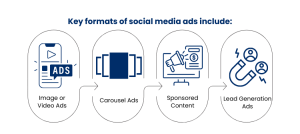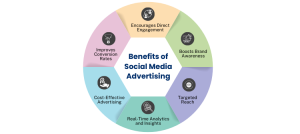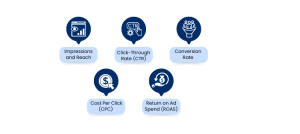to us to know how to promote business on the World Wide Web. We tell
them about different strategies that they can use different stages of their growth.
ContactUs
- +91-810-362-8856
- 106, Silver Arc Plaza, Janjeerwala Square, Indore – 452001, MP, India
-
Mon-Fri: 9am-8pm
Sat: 10am-6pm
Sun: Closed
Follow Us
The Power of Social Media Advertising for Your Business
In the fast-paced digital age, social media advertising has emerged as one of the most effective tools for businesses to reach and engage with their audience. Whether you’re a small business owner or the head of a large corporation, social media advertising can help you boost brand awareness, increase sales, and grow your customer base.
As we step into 2025, businesses need to leverage the ever-evolving landscape of social media to stay competitive. In this blog, we’ll explore the power of social media advertising , its benefits, key strategies, and how it can drive business growth.
1. What is Social Media Advertising?
Social media advertising involves placing paid advertisements on social platforms like Facebook, Instagram, LinkedIn, Twitter, and others to target specific audiences. These platforms offer businesses the ability to reach users based on their demographics, interests, behaviors, and engagement history. This targeted approach makes social media ads a more efficient and cost-effective method compared to traditional advertising.

Key formats of social media ads include:
• Image or Video Ads: Standalone ads that appear in users’ feeds or stories.
• Carousel Ads: Multiple images or videos that users can swipe through, ideal for showcasing various products or features.
• Sponsored Content: Paid posts that look similar to organic content but are marked as ads.
• Lead Generation Ads: Ads designed to capture user information directly within the platform, without needing to navigate to a separate website.
2. Benefits of Social Media Advertising
Social media advertising offers several key benefits, making it an essential part of any business’s digital marketing strategy.

a. Targeted Reach
One of the biggest advantages of social media advertising is the ability to precisely target your audience. Platforms like Facebook and Instagram allow businesses to filter their audience by demographics, interests, location, and even behaviors such as purchasing habits or online activity. This ensures that your ads are seen by the people most likely to engage with your business, increasing the chances of conversions.
b. Cost-Effective Advertising
Social media ads provide businesses with budget flexibility, allowing you to set daily or lifetime spending limits. You can also choose different payment models, such as pay-per-click (PPC) or cost-per-impression (CPM), ensuring that you only pay when someone engages with your ad. This makes it easier to control costs while achieving measurable results.
c. Real-Time Analytics and Insights
Social media platforms provide detailed analytics, allowing businesses to track the performance of their ads in real time. Metrics such as impressions, clicks, conversions, and engagement rates give insights into how well your ads are resonating with your target audience. These insights enable you to optimize your campaigns for better performance over time.
d. Boosts Brand Awareness
By consistently advertising on social media, businesses can increase their brand’s visibility and recognition. Even if users don’t immediately take action after seeing your ad, frequent exposure builds awareness and keeps your business top-of-mind, which may lead to future engagement or purchases.
e. Encourages Direct Engagement
Social media is a two-way communication channel, allowing businesses to engage with their audience through likes, comments, and shares. This creates opportunities for direct interaction with potential customers, building relationships and fostering loyalty.
f. Improves Conversion Rates
The targeted nature of social media advertising means you’re reaching people who are already interested in your product or service. Features like retargeting ads (which remind users who’ve visited your website or engaged with previous content) and built-in call-to-action buttons make it easier to drive conversions.
3. Effective Social Media Advertising Strategies
To get the most out of social media advertising, it’s essential to adopt well-thought-out strategies. Here are some key tactics that can help ensure the success of your campaigns.
a. Choose the Right Platform
Each social media platform serves a different demographic and purpose. Understanding which platforms align with your target audience is crucial to creating successful ads. For instance:
• Facebook and Instagram are ideal for B2C businesses, especially in industries like retail, fashion, and entertainment.
• LinkedIn is more effective for B2B marketing, targeting professionals, industry experts, and corporate decision-makers.
Make sure you invest in the platforms where your audience is most active.
b. Focus on Creative, High-Quality Content
To capture attention in a busy social media feed, your ads need to be visually compelling and engaging. Invest in high-quality images, videos, and eye-catching graphics. Use clear, concise messaging with strong calls to action that prompt users to take the desired next step, such as visiting your website or making a purchase.
c. Utilize Retargeting Ads
Retargeting is a powerful strategy for bringing back users who have previously interacted with your brand. If someone has visited your website or added items to their cart but didn’t complete a purchase, retargeting ads serve as a reminder, increasing the likelihood of conversion.
d. Leverage User-Generated Content (UGC)
Ads that incorporate user-generated content, such as customer reviews or photos of real users enjoying your product, build trust and social proof. People are more likely to engage with and trust content that comes from other consumers, making UGC a valuable asset in your advertising strategy.
e. Optimize for Mobile
The majority of social media users access platforms via mobile devices. To ensure a seamless user experience, optimize your ads for mobile viewing with easy-to-read text, fast-loading images, and vertical videos that are mobile-friendly. Poor mobile optimization can result in a higher bounce rate and lower conversions.
Related content-Making Social Media Work for You: Strategies for Success
4. Measuring Success: Key Metrics to Track
To determine the success of your social media advertising efforts, it’s important to track relevant key performance indicators (KPIs). These include:

• Impressions and Reach:
The number of people who have seen your ad. While reach refers to unique users, impressions count total ad views.
• Click-Through Rate (CTR):
The percentage of users who clicked on your ad after seeing it. A higher CTR indicates that your ad content is resonating with your audience.
• Conversion Rate:
The percentage of users who completed a desired action, such as making a purchase or signing up for a newsletter.
• Cost Per Click (CPC) and Cost Per Impression (CPM):
These metrics help you understand how much you’re paying for each click or view of your ad.
• Return on Ad Spend (ROAS):
This metric calculates how much revenue your ads generate compared to how much you spent on them. A positive ROAS means your campaign is profitable.
5. The Future of Social Media Advertising
As we move into 2024 and beyond, social media advertising will continue to evolve with emerging technologies. Artificial intelligence (AI) and machine learning will play an increasing role in optimizing ads, predicting performance, and delivering personalized content to users.
You may also like: How AI is Transforming Digital Marketing?
Moreover, the rise of social commerce, where users can shop directly from platforms like Instagram or TikTok, is changing the way consumers make purchases. Businesses can now guide users through the entire customer journey, from discovery to purchase, all within the social media ecosystem.
Conclusion
Social media advertising offers businesses a unique opportunity to connect with their audience, build brand awareness, and drive conversions. By utilizing the right strategies—such as targeting, creating engaging content, and optimizing for mobile—you can maximize the impact of your ads and grow your business.
As social media platforms continue to evolve, staying updated with the latest trends and technologies will ensure your business remains competitive in the digital landscape. With the right approach, social media advertising can be a powerful tool for your business’s growth and success in 2024 and beyond.
